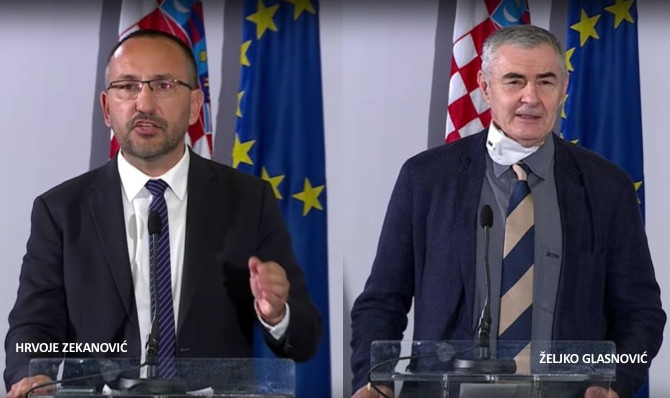While issues and matters relating to COVID-19 (coronavirus) is and has for some weeks now been overshadowing everything else there’s no doubt that times of upheaval (and COVID-19 coronavirus has created one) are always times of radical change, times of control; in this case control of people behaviour and choices in living. There are those who believe the pandemic is a once-in-a-generation chance to remake society, restructure processes that have not worked and build a better future. Others fear it may only make existing injustices worse. If there is one injustice defining life of ordinary citizens in the Croatian society it is corruption. Corruption at all levels of power or at all processes people’s lives depend upon – whether it is nepotism, whether it is bribery, whether it is embezzlement and theft – the pandemic and focus on measures to stop or slow-down the spread of COVID-19 currently seems a fertile ground for “business as usual” when it comes to dealing with corruption. This is regretful, for this crisis could also be a time when restructures are made in order to eradicate the crippling corruption in Croatia.
Rewind your mind back a few weeks and imagine someone telling you that within a month, schools will be closed. Almost all public gatherings will be cancelled. Hundreds of millions of people around the world will be out of work due to compulsory closures of shops and non-essential services. Governments will be throwing together some of the largest economic stimulus packages in history. In certain places, landlords will not be collecting rent, or banks collecting mortgage payments, and the homeless will be allowed to stay in hotels or empty apartments free of charge. Governments will delve into direct provision of basic wage or income. Large number of countries in the world will be collaborating – with various degrees of coercion and nudging – on a shared project of keeping at least two metres between each other whenever possible. European Union free travel and movement between member states will cease to exist and police and armies of each member state will make sure its borders are impregnable. More than likely than not, you would have labelled the person who told you all that, and more, as a lunatic, at least.
The size and speed of what is happening is dizzying, but also is the fact that we appear to be getting accustomed to hearing that democracies are incapable of making big moves like this quickly; that firm government control is what’s essential in order to save our lives and livelihoods! In many cases, and so too in Croatia, minority governments are on the road of using control of coronavirus threat to citizens in order prove that they are legitimate, and powerful. Any glance at history reveals that crises and disasters have continually set the stage for change, often for the better = but not always! The global flu epidemic of 1918 helped create national health services in many European countries. The twinned crises of the Great Depression and the second world war set the stage for the modern welfare state. Will the coronavirus crisis in Croatia set the stage for eradication of corruption, I wonder and wish it would.
Unless focused upon, corruption is likely to increase during these pandemic times in Croatia and measures, such as introduction of Code of Conduct or standards or strict checks and balances, independent audits of practices, standing down of the incompetent politically suitable employees from public administration, etc. must be introduced, otherwise, the fear for a decent livelihood will not only be fuelled by COVID-19.
On Friday 3 April 2020 in the Croatian Parliament, Members of Parliament Hrvoje Zekanovic (President of Croatian Sovereignists) and retired General Zeljko Glasnovic (Independent Member for Croats living outside of Croatia) addressed the Parliament with speeches that reflected on the possible dangers of government appointed body that has absolute powers at this time of crisis, political machinations and manipulations benefitting only the political party in power, the corruption embedded in the government system riddled with former communists and how the crisis may and should be used for major restructures which no government of Croatia has achieved so far.
Hrvoje Zekanovic, MP, among other things said: “… we have a strange scenario, surreal, unrealistic, and I wonder if maybe this crisis has been welcomed by some structures… banks for example… banks have struggled to place their money for years. Lots of money, cheap money, they even gave it out without charging interest. Suddenly all the countries of the world and our Croatia are rushing to the banks, to international markets, anywhere, seeking money to save their national economies. It is an interesting coincidence, that is, to know that someone is benefiting from this crisis because all countries in the world are very economically indebted at the moment, to whom, to banks. And the other fact is that the banks had a major problem with the placement of their funds, that they had piles of money, billions and billions of dollars or euros that they could not place. And now, Croatia has suddenly sobered up, the HDZ elections are over, the old HDZ president is the new HDZ president, Andrej Plenkovic, has swept up the competition and is free to deal with the corona crisis. All of a sudden, as politically imagined as it is, a new body, some new faces … and then suddenly it rushes to grips with the corona crisis. And suddenly we have a new body that has absolute powers. This body, the Croatian Parliament, gave it the ability to do whatever it wants. And in all the media, we have one real agitprop – yesterday, in the Open program, we have three ruling party politicians, zero from the opposition. Check out any news on Croatian television … or any other national television … and you will not be able to see, except in some sideline frames, the opposition or some other people who are critical of the government’s response to this crisis, and the mouths of national television will be full of praise for the measures of the Croatian government …”
Zeljko Glasnovic, MP, among other things said: “…we need to respect neutral sources, no one knows how long this will last… of course we cannot separate politics from the economy and today the economy from the coronavirus … I think the first step of any economic measure is that if we talk about solidarity, that we take care of the most vulnerable group of people. They are the disabled, the old people, etc. This is the real right-wing, not the red-right that first secured money for its three generations in advance… we do not yet have the origin of property or the names of people who have bank accounts abroad, and we know that maybe everyone of them was in the Party (Communist) … Now is the time not only for economic security, but the time is now, because crisis is the best stimulus, crisis and fear, for best structural reforms that no government has ever made. We have tightened the belts, the grey economy is double what it was in the European Union, and we know how many, well, how some Croats are creative accountants, they are masters of it… how is it possible for one person, as one small example, to be spending public money and spending 170,000 kunas on representation (entertainment) without having to answer to anyone! That’s right, the grey economy and now the professionalisation of the administration and now it’s time for all these institutions to work in sync to see that the money is going where it should go … you enjoyed the Party, you are doing well today, you have created a second generation of emigrants, and I would send all of you an auditor-general, this inspector … I don’t know what his financial status is … you are all linked together, I don’t trust you, I believe in God and mathematics, I would solve everything in three months and would first come to your door …”
The Council of Europe’s Group of States against Corruption (GRECO) has published on 24 March 2020 its fifth round evaluation report (for full pdf report click here) on Croatia dealing with preventing corruption in government (top executive functions) and the police and it will be most interesting following up on what is being done to curtail corruption; to bring it down to insignificant levels.
The Group of States against Corruption (GRECO) is a Council of Europe body that aims to improve the capacity of its members to fight corruption by monitoring their compliance with anti-corruption standards. It helps states to identify deficiencies in national anti-corruption policies, prompting the necessary legislative, institutional and practical reforms. Currently it comprises the 47 Council of Europe member states, Belarus, Kazakhstan and the United States of America
Croatia joined GRECO group in 2000 and this year’s report was focused on evaluating the effectiveness of the measures adopted by the authorities of Croatia to prevent corruption and promote integrity in central governments (top executive functions) and law enforcement agencies. The report contains a critical analysis of the situation, reflecting on the efforts made by the actors concerned and the results achieved. It identifies shortcomings and makes recommendations for improvement. GRECO’s plan is for Croatia to report back on the action and measures taken, on compliance, in response to GRECO’s recommendations within 18 months of the adoption of this report; that would be around mid-2021.
In this report GRECO considers that developments in recent years have shown a need to ensure that integrity standards also apply to people working in an advisory capacity for the government. More specifically regarding members of the government, state secretaries and assistant ministers, the report calls for the adoption of a code of conduct, to be supplemented with practical guidance, briefings on the integrity rules in place and confidential counselling.
When it comes to the police, the report notes a relatively low level of trust in the police and considers that more needs to be done to prevent corruption risks within the police itself.
GRECO further recommends that the current rules on the taking up of employment – when a person entrusted with top executive functions leaves an official position – need to be broadened and considers that the lack of rules on reporting and disclosing contacts with lobbyists/third parties that seek to influence the public decision-making process constitutes a gap. This gap must be filled in order to further improve transparency.
Efforts to prevent corruption risks within the police itself, GRECO report says, should start with comprehensive risk assessment of corruption-prone activities within the police, as a basis to adopt an integrity and anti-corruption strategy for the entire police force. The report furthermore acknowledges the existing code of ethics for police officers but considers that it would need to better cover all integrity matters and be supplemented with an explanatory manual to become a truly practical tool and a reference point for the to-be-revised police trainings. Furthermore, more attention needs to be paid to the current appointment and promotion processes of police officers and their employment after they leave the police. Finally, GRECO recommends that a requirement be established for police staff to report integrity-related misconduct they come across in the police service.
The institutions or bodies in Croatia that deal with fighting against corruption are several. They include the Commission for Monitoring the Implementation of Anti-Corruption Measures, the Ministry of Justice’s Anti-Corruption Sector, the Police National Office for the Suppression of Corruption and Organised Crime (PNUSKOK), the USKOK – Office for the Suppression of Corruption and Organised Crime and the National Council for Monitoring the Implementation of the Anti-Corruption Strategy. Indeed, the Croatian people have been listening to its governments saying that corruption must be eradicated for decades and yet nothing much changes. Corruption and clientelism thrive unabated, bar for a handful of legally pursued cases of high-profile personalities. The fact that corruption keeps on thriving in Croatia comes as no surprise – those in power and high positions would have to remove themselves from those positions in order for eradication to work. Many, many are those who held powerful positions during communist Yugoslavia, or they are the descendants of them. Hence, nothing short of thorough weeding and lustration will eradicate corruption. The judiciary if filled with former communists or descendants of communists who had amassed personal wealth through corruption; the same goes for many members of parliament, for members of major political parties, for officers in government and public administration, for heads of government owned companies, for heads of many politically active NGO’s…The abuse of public institutions for personal gain is blinding in Croatia and the current government control of almost everything citizens do in this COVID-19 pandemic could easily lead to pushing Croatia even further down the world corruption-free index ladder. Clientelism is rife and the pandemic will surely feed it more in the environment of having a government-created body with absolute powers in what a citizen may or may not do; who gets the lucrative contracts and who does not! Ina Vukic




